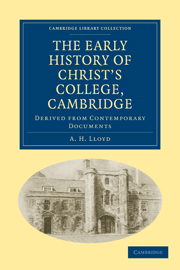Book contents
- Frontmatter
- Preface
- Contents
- LIST OF ILLUSTRATIONS
- List of Abbreviations
- Chronological Summary
- Dedication
- Chapter I William Byngham, the First Founder
- Chapter II The Dispute with John Langton
- Chapter III The First Royal Licence, 1439
- Chapter IV The Expansion of the Milne Street Site
- Chapter V The Royal Licences of 1442
- Chapter VI Marking Time: 1443 to 1446
- Chapter VII The Royal Licence of 1446 and its period
- Chapter VIII The Foundation Charter of the College of Godshouse and its period
- Chapter IX The Relationship of Godshouse and Clare Hall
- Chapter X The Last Days of William Byngham
- Chapter XI The Proctorship of John Hurte, 1451–1458, and of William Fallan, 1458–1464
- Chapter XII The Proctorship of William Basset, 1464–1477
- Chapter XIII The Proctorship of Ralph Barton, 1477–1490
- Chapter XIV The Proctorship of John Syclyng: Early Years, 1490–1496
- Chapter XV The Proctorship of John Syclyng: Later Years, 1496–1506
- Chapter XVI The Negotiations between Godshouse and the Lady Margaret
- Chapter XVII Syclyng's Death and Will
- Chapter XVIII The Buildings and Furniture remaining from the Godshouse period
- Chapter XIX Godshouse and Christ's College
- Appendix
- A
- B
- C
- D The Financial Position of the College at the Death of the Lady Margaret
- E The Council in the Marches of Wales: Documents from the Reign of Henry VII found in the College
- Index
- Plate section
- Frontmatter
- Preface
- Contents
- LIST OF ILLUSTRATIONS
- List of Abbreviations
- Chronological Summary
- Dedication
- Chapter I William Byngham, the First Founder
- Chapter II The Dispute with John Langton
- Chapter III The First Royal Licence, 1439
- Chapter IV The Expansion of the Milne Street Site
- Chapter V The Royal Licences of 1442
- Chapter VI Marking Time: 1443 to 1446
- Chapter VII The Royal Licence of 1446 and its period
- Chapter VIII The Foundation Charter of the College of Godshouse and its period
- Chapter IX The Relationship of Godshouse and Clare Hall
- Chapter X The Last Days of William Byngham
- Chapter XI The Proctorship of John Hurte, 1451–1458, and of William Fallan, 1458–1464
- Chapter XII The Proctorship of William Basset, 1464–1477
- Chapter XIII The Proctorship of Ralph Barton, 1477–1490
- Chapter XIV The Proctorship of John Syclyng: Early Years, 1490–1496
- Chapter XV The Proctorship of John Syclyng: Later Years, 1496–1506
- Chapter XVI The Negotiations between Godshouse and the Lady Margaret
- Chapter XVII Syclyng's Death and Will
- Chapter XVIII The Buildings and Furniture remaining from the Godshouse period
- Chapter XIX Godshouse and Christ's College
- Appendix
- A
- B
- C
- D The Financial Position of the College at the Death of the Lady Margaret
- E The Council in the Marches of Wales: Documents from the Reign of Henry VII found in the College
- Index
- Plate section
Summary
THE SOURCES OF THE GODSHOUSE REVENUES
Dr Peile in dealing with this matter writes: ‘The revenue of God's House consisted chiefly of pensions from “alien priories” appropriated by Henry V during his war with France’. After giving certain particulars of amounts, he proceeds: ‘An income more unsatisfactory and more difficult of collection in the fifteenth century can hardly be imagined’.
Here and there in the foregoing pages it has been maintained that such difficulties as the college encountered in getting in its revenues have been greatly overestimated, that some arrears were only technically such, due in large measure to the date of making up the college accounts, and that instances are found in the records of other colleges of rents and other income due to them from places in and near Cambridge falling into arrear and involving ultimate loss, no less than those arising from sources far afield. The patent rolls of the fifteenth century, and other documents throwing light upon its social conditions, such as the Paston Letters, abound in evidence that the collection of payments due from secular persons and properties was no less difficult than their collection from alien priories. It would seem not unlikely that lack of information as to the true nature of alien priory sources of income is responsible for attribution to them of difficulty in collection far in excess of the facts and, in particular, there is a vagueness and prejudicial suggestiveness about the term ‘alien priories’ which would tend to disappear (1) by the use of the more exact ‘possessions of alien priories’, (2) by some account of their history leading up to their final suppression.
- Type
- Chapter
- Information
- The Early History of Christ’s College, CambridgeDerived from Contemporary Documents, pp. 400 - 429Publisher: Cambridge University PressPrint publication year: 2010First published in: 1934

